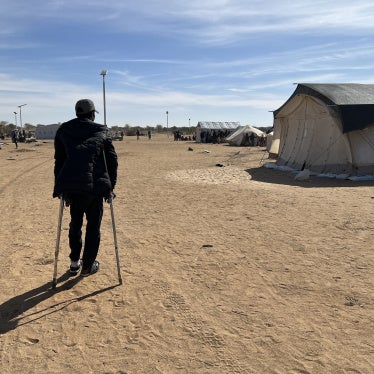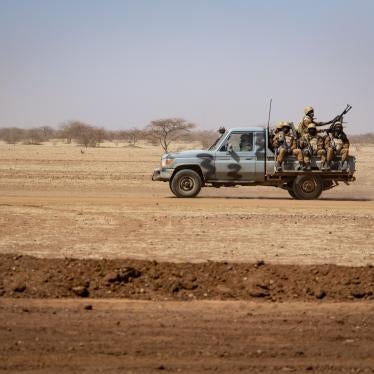(New York)- United Nations Security Council members should act decisively to protect civilians and press Sudan to end escalating human rights violations in Darfur by establishing a mandatory Darfur Recovery Fund for Sudanese oil revenues, Human Rights Watch said today. In a letter to Security Council members, Human Rights Watch also called for targeted sanctions on top Sudanese leaders.
The Sudanese government continues to reject the full deployment of a proposed African Union-United Nations protection force to Darfur and resist all efforts to improve civilian protection for some 2.5 million displaced Darfurians.
“Last week’s letter from President El Bashir to Secretary General Ban Ki-moon effectively reneges on Sudan’s previous agreement to an African Union-United Nations protection force for Darfur,” said Peter Takirambudde, Africa director at Human Rights Watch. “The Security Council should now create the Darfur Recovery Fund and impose targeted sanctions on top Sudanese officials responsible for Darfur policy.”
Human Rights Watch called for a mandatory Darfur Recovery Fund into which all revenues from Sudanese oil exports would be paid.
The Darfur Recovery Fund would be a new measure, under Chapter VII of the United Nations Charter. It would permit both the Sudanese government and private firms to continue to export oil – and Sudan’s existing customers could continue to buy it – but all proceeds from such exports and all royalties and similar payments owed to the Sudanese government would be required to be paid directly to the fund. The proposed fund would be administered by an independent UN-designated financial institution (such as the World Bank) that would serve as escrow agent.
The fund would distribute the proceeds to the government of South Sudan in accordance with the Comprehensive Peace Agreement of January 9, 2005; to the oil exporting firms for oil production and delivery costs; and to the Sudanese government for those substantiated expenditures on social services that are currently paid for with oil export revenues. The balance of the proceeds would go to victim compensation and recovery projects in Sudan, with the goals of facilitating the safe return of displaced persons, assistance in reconstructing homes, and replanting fields and other humanitarian needs in Darfur and elsewhere in Sudan.
To ensure transparency, all Darfur Recovery Fund receipts and disbursements would be subject to regular independent audits, as would the assistance and recovery projects carried out with fund assistance, as recommended by the US General Accounting Office report for future UN-authorized trust fund programs. Domestic oil sales (about 15 percent of Sudan’s production) would not be affected by or subject to the fund.
Human Rights Watch said that the Security Council should also specify the actions required by the government of Sudan for recision of the mandatory fund procedure. These conditions should include:
- Consent by the Sudanese government to the full deployment of an effective and robust African Union-United Nations protection force in Darfur with a mandate to take all necessary measures to protect civilians;
- Ending of further financial or logistical support to the “Janjaweed” militias and cooperation with African Union and the United Nations on a genuine plan for their disarmament;
- An immediate end to attacks on civilians by Sudanese armed forces and Janjaweed militias;
- Cooperation with the International Criminal Court in its investigations of crimes in Darfur and on any requests for extradition of Sudanese citizens; and
- Full and unimpeded access to and within Darfur for Sudanese and international humanitarian workers, human rights organizations and media. When the Security Council finds that these conditions have been met, the Darfur Recovery Fund would be terminated and any remaining proceeds distributed to qualifying recipients in accordance with the fund’s procedures.
Human Rights Watch has long called on Security Council members to impose individual sanctions (travel bans and asset freezes) on key Sudanese and militia leaders for their role in serious violations of international human rights and humanitarian law. Human Rights Watch said the Security Council should act without delay to impose targeted sanctions on those senior Sudanese officials identified in the UN Panel of Experts reports and elsewhere as they are authorized to do under Security Council Resolution 1591.
Questions and Answers on the Darfur Recovery Fund
Q. Will the Darfur Recovery Fund deprive ordinary Sudanese citizens of essential goods and services by diverting oil revenues to the fund?
A. This situation seems highly unlikely since the fund will be required to pay to the Sudanese government that portion of oil export revenues that is demonstrably used now for domestic social services, whether in Darfur or elsewhere. The diversion of the share of oil revenues currently being used by the Sudanese government to fuel its military activities in Darfur (and for a range of personal uses) will have minimal negative effect on ordinary citizens. The fund is authorized to spend its money not only on Darfur recovery projects, but also on the humanitarian needs of all Sudanese citizens, whether or not in Darfur. Moreover, long-term development in Sudan almost certainly depends on a satisfactory resolution of the Darfur conflict, and the mandatory Darfur Recovery Fund may represent the best current opportunity to bring about that resolution.
Q. How does this proposal relate to the Victim Compensation Fund that Human Rights Watch has previously advocated?
A. The Darfur Recovery Fund builds on and incorporates the Victims Compensation Fund proposal by allocating a portion of oil revenues to Darfur victims. However, the Darfur Recovery Fund also seeks to capture and redirect the balance of such revenues away from military use by the Sudanese government.
Q. Isn’t the Darfur Recovery Fund just another name for the Iraq Oil-for-Food program, which was said to be both ineffective and rife with corruption?
A. While there are some similarities between these two remedies, they are in many respects quite different. The Oil-for-Food program was administered directly by Iraqi authorities, which, according to the Volcker Committee report, were able to extract approximately US$229 million in hidden surcharges from the world’s oil purchasers through the cooperation of most major countries and a private financial institution that served as both escrow agent for that program and banker for some of its customers who circumvented the program’s controls. More significantly, most of the corruption (some US$1.53 billion) in the Oil-for-Food program involved kickbacks paid to the Iraqi government by vendors of humanitarian goods and services. All told, these two forms of corruption amounted to US$1.8 billion, just under 2 percent of the US$98.7 billion received and spent by Iraq during the program’s seven-year life.
In the case of the Darfur Recovery Fund, all oil proceeds payable to the fund would be administered by an independent international financial institution (such as the World Bank), would be subject to periodic independent audits of all funds received and expended, and would involve a much smaller universe of oil purchasers than the Oil-for-Food program. Even if some portion of the fund were manipulated into improper Sudanese or other accounts, the fund’s central purpose of preventing the use of Sudan’s oil revenues to fuel the government’s continuing military activities in Darfur that violate international human rights and humanitarian law would be substantially accomplished.
Q. Why wouldn’t Sudan simply shut down oil production since it would no longer be enjoying the full benefits of foreign sales?
A. This is unlikely for several reasons: the oil exporting companies will continue to receive production and distribution payments, and, from the government’s perceptive, some foreign oil revenue will always be better than no oil revenue in order to support “normal” governmental operations (and far better than importing fuel for domestic use while denying itself export revenue). In addition, for technical reasons, it is not easy to stop and restart oil production, and doing so can present risks to future pumping efficiency that Sudan is unlikely to want to run.
Q. Wouldn’t the Darfur Recovery Fund unfairly deprive the Sudanese government of the ability to fight those “non-signatory” rebel forces that rejected the May 2006 Darfur Peace Agreement?
A. As a practical matter, the government could achieve increased protection against rebel forces simply by consenting to the deployment of the proposed international force in Darfur. By complying with the remaining conditions specified above for rescinding the fund, the Sudanese government would recover full access to oil export revenues.
Q. Isn’t the Darfur Recovery Fund unrealistic because China will never consent to it, either in its role as a permanent member of the Security Council or as Sudan’s largest oil purchaser?
A. There is reason to believe that China, too, is increasingly frustrated by Sudan’s continuing refusal to accept an international force that it seemed to accept in meetings last fall with, among others, the Chinese. Since China is opposed to either non-consensual military force against Sudan or personal sanctions against its leaders, an economic remedy that permits China to continue to buy Sudanese oil may be acceptable if it helps persuade Sudan that the time has come to change its approach to both Darfur and the international community.
Notes on the Sudanese Oil Industry
Sudan has approximately 563 million barrels of proven reserves and the Economist Intelligence Unit (EIU) estimated that Sudan would produce about 500,000 barrels of oil per day in 2007. About 82,000 barrels per day is used for domestic consumption while the rest is exported. The EIU estimated the value of exports in 2007 would be about US$7.8 billion.
Sudan’s oil production is currently concentrated in four main projects by foreign investors. The Greater Nile Petroleum Operating Company (GNPOC), comprised of the China National Petroleum Company (CNPC), Malaysia’s Petronas, the Oil Natural Gas Company of India, and the Sudan National Petroleum Company (Sudapet) produces the bulk of the country’s oil. Petrodar, a consortium of CNPC, Petronas, and Sudapet are developing two blocks that could produce as much as 300,000 barrels per day. The White Nile Petroleum Company (Petronas, ONGC, Sudapet) is developing another project that could produce about 80,000 barrels a day. And the last project is one run by CNPC in Block 6 that produces about 40,000 barrels per day.
While the state-owned company has small stakes in some of these projects, it does not have many financial and technical resources and has to partner with foreign investors to develop projects. As a result, the bulk of the government of Sudan’s oil revenue comes from oil sales in its share of projects and taxes, duties, and royalties on foreign investors.
According to the EIU, the government’s total revenue for the first nine months of 2006 (in billions of Sudanese Dinars) breaks down this way, with oil representing approximately 48 percent of total government revenues for that period:
Fiscal performance, Jan-Sept 2006 Revenue (Sudanese Dinars in billions unless otherwise indicated)
- Tax revenue 430
- Oil revenue 518
- Other non-tax revenue 133
- Total revenue 1,081








